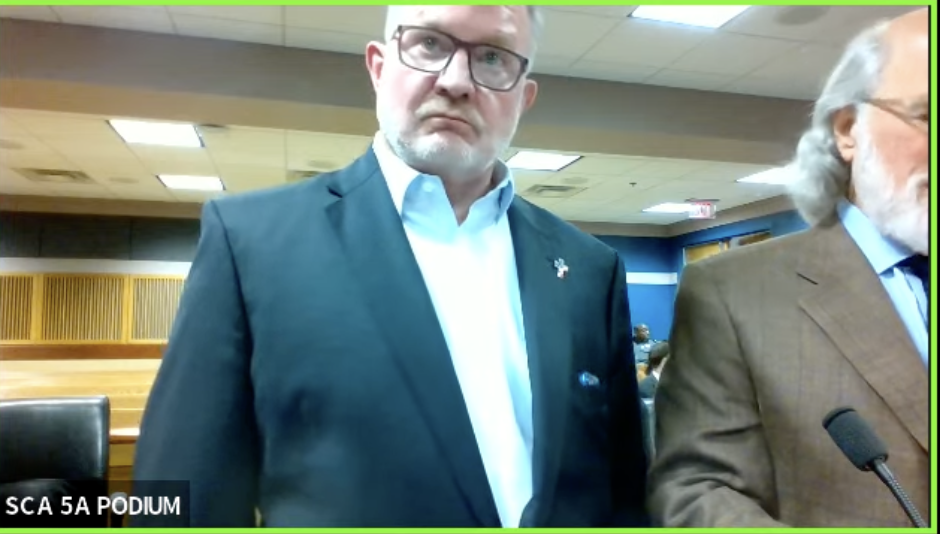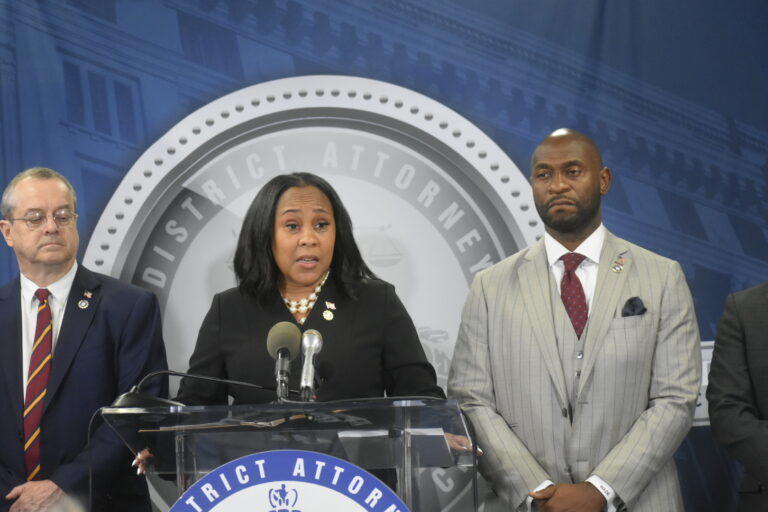
Caption
Atlanta bail bondsman Scott Hall is the first defendant to strike a deal with prosecutors in the sweeping 2020 election interference racketeering case.
Credit: Fulton County Superior Court YouTube

Atlanta bail bondsman Scott Hall is the first defendant to strike a deal with prosecutors in the sweeping 2020 election interference racketeering case.
Later this month, a courtroom in Atlanta is expected to host the first trial in the Georgia election interference case that includes former President Donald Trump and 18 others who advanced his efforts to overturn the 2020 presidential race.
Attorneys Sidney Powell and Kenneth Chesebro asked for speedy trials, and jury selection is slated to begin Oct. 20.
But it’s possible that Chesebro, who authored memos that led to some Republicans sending fake elector slates to Washington, and Powell, who played a role in the effort that saw election data illegally copied in rural Coffee County, might take plea deals to avoid a lengthy trial.
They wouldn’t be the first, though. Atlanta bail bondsman Scott Hall, facing seven felonies for his part in the Coffee County saga, entered a surprise guilty plea Sept. 29 that indicates we could see more defendants take deals and testify against more central figures like Trump, his former attorney Rudy Giuliani, and former Georgia GOP Chair David Shafer.
The developments come as a federal judge has rejected efforts by Shafer, two other fake electors and a former Justice Department official to move their cases out of Fulton County as well as a steady stream of pre-trial motions that shine a light on the possible strategies of prosecutors and defendants.
This week, we look at the latest developments in the Georgia RICO case.

Fulton County District Attorney Fani Willis unveiled a grand jury’s charges against former President Donald Trump and 18 others as part of a wide-ranging RICO case.
It’s been almost two months since Fulton County District Attorney Fani Willis announced charges against Donald Trump and 18 others for their failed efforts to undo Trump’s 2020 election defeat in Georgia.
And thanks to Georgia’s speedy trial law, we are now just weeks away from the first two defendants potentially facing a monthslong jury trial where prosecutors will outline the laws allegedly broken and the actions taken that tried to reverse Trump’s 2020 election defeat.
There are more than "150 witnesses that the state intends to call," special prosecutor Nathan Wade said at a Sept. 6 hearing. "We contend that we must prove the entire conspiracy against each and every one charged."
Kenneth Chesebro’s role in the conspiracy includes authoring memos that outline how Republicans could send falsified slates of presidential electors to Washington in order to circumvent the official results.
Sidney Powell’s case includes involvement with a scheme that saw Trump supporters and election deniers gain access to the election systems in rural Coffee County and unlawfully copy data from voting machines, election servers and other equipment.
In a hearing last month, both argued before Judge Scott McAfee their cases should be heard speedily, but separately from each other.
"Why should Mr. Chesebro have to deal with a jury who's gonna sit there for weeks, if not months, and listen to all of this evidence related to Coffee County and Ms. Powell?" attorney Scott Grubman asked. "He's never been there. He's never met Ms. Powell, he's never emailed, texted or called her. He's never spoken with her directly or indirectly."
Powell’s attorney Brian Rafferty agreed, noting the other allegations in the sweeping indictment that did not involve her.
"Ms. Powell had nothing to do with false statements to state legislators, nothing to do with false statements to high-ranking government officials, nothing to do with false Electoral College documents, nothing to do with the election worker here in Fulton County, nothing to do with solicitations of the Department of Justice, nothing to do with solicitations to the Vice President," he said. "The only thing which he's alleged to have involvement is as my co-counsel have said, is this Coffee County matter. And frankly, Your Honor, the way the government has characterized that — the evidence is going to show they're incorrect."
Both sets of attorneys have also maintained their clients have done nothing wrong, and in televised court hearings and legal motions have accused the Fulton County DA’s office of misconduct and handling pre-trial requests for discovery evidence in an unfair manner.
In a hearing last week, Powell’s attorney Rafferty alleged prosecutors were covering up evidence that might prove Powell’s innocence, also known as Brady material, amidst thousands and thousands and thousands of documents handed over.
Powell’s lawyer also asked the court to dismiss the charges against her, citing alleged prosecutorial misconduct because, in his words, there was no way a grand jury could have indicted her for crimes she did not commit.
"The allegation that we're withholding evidence, suppressing evidence, and that we're committing prosecutorial misconduct are outrageous," Will Wooten with the DA’s office said in response. "They're not true. No. 1: the defendant says in her motions, 'to indict Ms. Powell, the district attorney and special prosecutor necessarily committed prosecutorial misconduct.' That is absurd. It's unsupported. The court has heard no evidence other than 'We don't like the fact that we got indicted. We disagree with the state's theory of the case, and therefore there must have been prosecutorial misconduct.' That is not how this works!"
Judge Scott McAfee agreed, dismissing that motion and noting those arguments would have to come before a jury.
"Certainly, I can sympathize with the idea that someone who vigorously contests and believes in their innocence doesn't want to have to sit through a long trial," he said. "But that is the state's right to do."
McAfee also dismissed a request by Chesebro’s lawyers to dismiss the case because special assistant district attorney Nathan Wade failed to file his oath of office, quoting a Monty Python sketch in a rather scathing rebuke of the motion that didn’t have merit.
“And if this parrot of a motion is somehow not yet dead,” McAfee wrote, “the defendant has failed to establish how Special ADA Wade’s actions resulted in prejudice, i.e., how his assignment singlehandedly changed any specific actions taken during the investigation or resulted in the true bill of indictment.”
The pre-trial wranglings are starting to give us an idea of the scope of potential arguments for both the DA’s office and defendants, too, thanks to documents filed pertaining to potential witnesses.
Prosecutors have filed requests for out-of-state witnesses that include several top GOP officials in other swing states that saw fake electors, former Georgia-based attorney and election conspiracist Lin Wood, InfoWars host Alex Jones and more, while some of the potential names on the list Chesebro plans to call include Georgia’s fake electors, Republican National Committee Chairwoman Ronna McDaniel and other people involved with executing the fake elector scheme.
All of these motions, updates and pre-trial motions come as jury selection is slated to begin Friday, Oct. 20 with half of the 900 prospective jurors summoned to the courtroom to begin what is expected to be about a four-month process meeting four days a week, eight hours a day with breaks around the Thanksgiving and Christmas holidays.
But it’s also possible that there could be no trial at all after a surprising — yet expected — development with a different defendant in the case, Scott Hall, entering a guilty plea as part of a deal struck with prosecutors.
Hall, an Atlanta-area bail bondsman, was facing the racketeering charge as well as six other felony counts, ranging from conspiracy to commit election fraud to conspiracy to commit computer trespass and defraud the state for his participation in the Coffee County election data breach.
With his lawyer by his side, Hall answered the necessary questions to enter his guilty plea to five misdemeanor counts of conspiracy to commit intentional interference with performance of election duties. Instead of face the prospect of a multi-defendant trial down the road, including the possibility of sharing a courtroom with Donald Trump, Hall’s negotiated sentence was relatively light, including five years of probation and a $5,000 fine.
Hall is also not allowed to serve as a poll worker or participate in administering elections. He also had to write a letter of apology, record a statement for the DA’s office and complete 200 hours of community service. Most importantly, Hall agreed to testify truthfully in the future, including in trials against co-defendants.
Some experts say Hall’s plea deal could be the tip of the iceberg for many of the remaining defendants not named Donald Trump. According to the Atlanta Journal-Constitution, several of the RICO defendants have been approached by the prosecution regarding plea deals, though at this time it’s not clear if any will accept deals or what the terms would be.
Indeed, when Judge Scott McAfee asked the DA’s office if there were offers made to Powell and Chesebro to avoid the October trial, prosecutors said they were working on presenting something to defense attorneys soon.
If and when that happens, you’ll hear about it here on this podcast.
There have been key updates with some of the defendants on the non-speedy trial track, too. A federal judge has now denied requests by all five people seeking to move their charges to federal court, most recently ruling against the three fake electors charged in connection with that plot and a former Department of Justice official who wrote a memo falsely claiming the DOJ had doubts about Georgia’s election results.
Those denials, plus that of former White House Chief of Staff Mark Meadows, are now in front of the 11th Circuit Court of Appeals. Meanwhile Trump’s lawyers say he will not try to move his case to federal court.
We examine a growing discussion over voter referendums in Georgia.
Fights over voting access aren’t limited to Georgia Republicans. A petition drive against the Democratic-led City of Atlanta’s new public safety training center has resulted in more than 100,000 alleged signatures of residents who want to see the controversial site put in front of voters. But legal hurdles and pushback from the mayor’s office has ignited a firestorm of conversation and action.
We look at the on-the-ground efforts to stop the Atlanta Public Safety Training Center, also known as “Cop City,” at the ballot box.
Battleground: Ballot Box is a production of Georgia Public Broadcasting and is produced by Chase McGee. Our engineer is Jake Cook, our editor is Josephine Bennett and the theme music was created by Stephen Fowler. Subscribe to our show at GPB.org/battleground or anywhere you get podcasts.